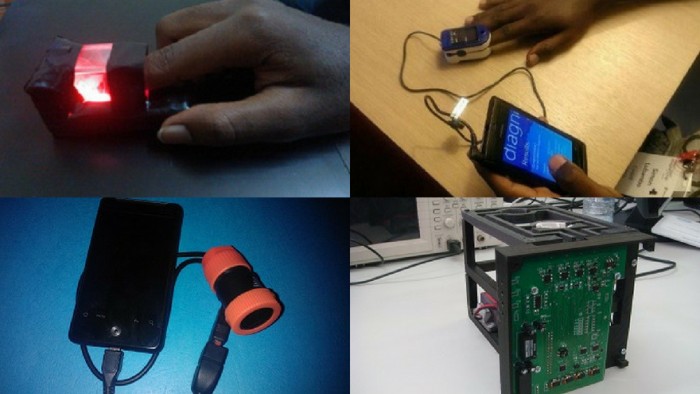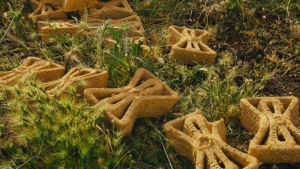Ugandan software engineer Brian Gitta and his team at Matibabu have all been diagnosed with malaria several times. There must be a way, thought Gitta, to streamline the diagnosis experience – early detection is one of the key factors to successful treatment.
It was around 2014 with the release of Shazam that Gitta thought there must be a way to detect malaria in the blood with the same instant result that the music app offered. They co-founded Matibabu in the same year, a non-invasive testing kit that detects malaria without the need to draw blood.
Known as the first smartphone-based diagnosis system for malaria, it’s low-cost, reusable device that clips onto a patient’s finger, requiring no specialist expertise to operate. The results are available within one minute on a mobile phone linked to the device.
Their ingenuity paid off. The 24-year-old software engineer recently won the Africa Prize for Engineering Innovation – he is the youngest winner to date. He was awarded the first prize of UK £25,000 at an awards ceremony in Nairobi, Kenya in June to further the device’s development.
Matibabu, which means ‘medical centre’ in Swahili, works by shining a red light through the user’s finger, detecting changes in the shape, colour and concentration of red blood cells, all of which are affected by malaria.
Working together with an app, the device is able to read the user’s blood's oxygen through their skin, allowing the hardware to differentiate between infected and non-infected red blood cells.
The disease is common in sub-Saharan Africa and early diagnosis without the need for specialist knowledge could be a gamechanger. Speaking to co-founder Moris Antwine, it’s clear that the device aims to be a bridge between people and healthcare services.
“There’s a serious gap between communities and how they access basic health care which is as a result of less funding from governments towards delivering the necessities to the last mile,” explains Antwine.
While the number of malaria deaths has lowered, malaria still kills tens of millions of people, particularly affecting children under the age of 5.
Matibabu is currently undergoing testing in partnership with a national hospital in Uganda and is sourcing suppliers for the sensitive magnetic and laser components required to scale up production.
For Antwine, the team’s purpose has always been to make Matibabu accessible to both people and doctors.
“Since inception, Matibabu has undergone several iterations to better refine the product towards developing a market-ready version,” he explains.
Matibabu is one of a number of revolutionary technologies aiming to provide better healthcare options in Africa. African designers have recognised that as a developing continent, Africa can leapfrog traditional approaches to treatment and instead find streamlined, human-centred designs that speak to unique needs in nations like Uganda.
Dr William Mapham, a speaker at this year’s Design Indaba Conference, recognised a need while working at the Vula Emehlo Eye Clinic in rural Swaziland. He noticed that patients had to travel for many hours to receive specialist care. The team decided to use smartphone technology to bridge this gap.
The Vula app gives health workers – particularly those in remote rural areas – a tool that helps to get patients quick and efficient specialist care by connecting them to those specialists.
Now being used across the country for both its intended purpose and as a teaching tool, it is ensuring that, even in the most remote areas, patients in need of something like cataract care don't have to go blind awaiting specialist advice.
In Cameroon, Gifted Mom is a low-tech, m-health platform that aims to reduce the number of deaths of pregnant women and infants.
Founded by Cameroonian entrepreneur Alain Nteff, Gifted Mom, a mobile health platform that uses low-cost technology to prevent maternal and infant deaths through offering a variety of services.
The app allows expectant mothers to register in order to receive advice about their maternal health and to receive reminders for check-ups, alerts or vaccinations and follow-ups with their antenatal care. The service also provides sex education to teenagers and advice about family planning.
Like Mapham and Gitta, Nteff founded Gifted Mom to combat the lack of knowledge and access to proper healthcare in remote rural communities. By 2016, the platform had helped around 3 400 pregnant women and mothers, with the help of 270 medical professionals in over 21 communities in Cameroon, increasing the rate of antenatal care attendance and infant vaccination by over 20 per cent.
For more on healthcare in Africa, read next:
MOMALA – the healthcare app that detects malaria on the spot







